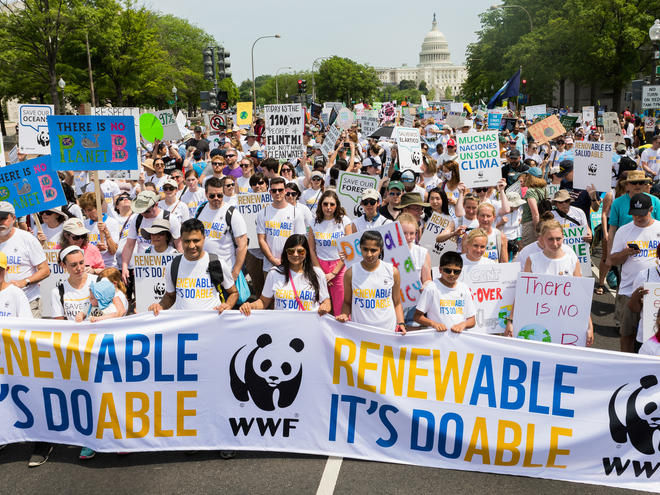
Our climate is changing around us faster than predicted. From more frequent and extreme storms to unprecedented heat waves, we’re feeling the impacts of human-caused global warming.
But we still have time to change course. We can avoid more dire impacts of climate change by limiting warming to 2.7° F (1.5° C), according to a new report by the United Nations.
The world is already 1.8° F hotter than it was between 1850 and 1900, the pre-industrial era. And while there’s no question that limiting warming to 2.7° F will be difficult, there’s also no question that it’s worth it.
We need to work together to eliminate the release of heat-trapping carbon by 2050—and, ideally, by 2040.
This is not a challenge government can solve alone; we need collaboration across businesses and communities as well. We also need to help wildlife and people cope with a rapidly warming planet.
WWF is working with national, state, and city governments, and businesses to deliver on the ambitious goals of the Paris Agreement. Signed by nearly 200 countries, the pact requires all nations to pursue efforts to limit global temperature increase to 2.7° F to stave off some of the worst impacts of a warming planet.
Here’s what’s at stake if we limit warming to 2.7°F versus 3.6°F.
1.5° C (2.7° F) |
2° C (3.6° F) |
||
Sea-Level Rise |
Sea level rise by 2100: 1.5 feet 1.8 feet |
||
| Rising sea levels could impact tens of millions of people and wildlife around the world, particularly those living on coasts and islands | |||
Coral Bleaching |
Coral reefs at risk of severe degradation by 2100: 70% Virtually All |
||
| Changes in water temperature causes algae to leave coral reefs, turning them white and making them vulnerable to disease and death—a phenomenon known as coral bleaching. | |||
Ice-Free Arctic Summers |
Ice-free Arctic summers: At least one every 100 years At least one every 10 years |
||
| Arctic sea ice recedes every summer, but still covers millions of square miles of ocean today. But the Arctic is warming faster than anywhere else on Earth and ice-free summers could become a reality. | |||
Heat Waves |
People exposed to extreme heat waves at least once every 20 years: 700 million 2 billion |
||
| Heat waves will become more frequent and severe around the world, affecting hundreds of millions—or even billions—of people if we don’t act. | |||
Flooding |
Increase in flood risk: 100% 170% |
||
| Global warming increases the risk of more frequent—and heavier—rainfall, snowfall, and other precipitation. And as that risk increases, so too does the risk of flooding. | |||
Published October 08, 2018 at 05:00AM
No comments:
Post a Comment